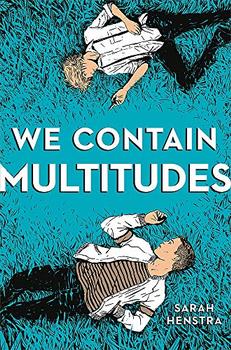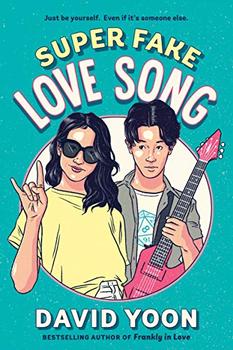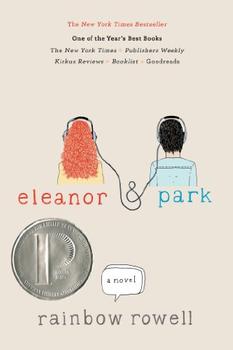Summary | Excerpt | Reviews | Beyond the book | Read-Alikes | Genres & Themes | Author Bio

On paper, Adam Kurlansky and Jonathan Hopkirk could not be more different. But ironically enough, it's paper—more specifically, the act of writing letters—that brings the two boys together. Adam (known as Kurl) is a massive star at his Minneapolis high school. He's a big man—literally—the hero of the football team and the object of admiration and respect. Kurl might achieve football victories easily, but academic success has been a bit more elusive; most recently, he has failed Twelfth-Grade Applied English and needs to repeat it in order to graduate. That's why he finds himself matched up with sophomore Jonathan Hopkirk for a letter-writing assignment proposed by their shared English teacher. Jonathan (whom Kurl first addresses as JO, for "jerkoff," in his rather grumpy initial letter) is small and slight, and an aspiring poet. He's also openly gay (though he's never had a real boyfriend), and further exacerbates his outsider status by dressing in a flamboyant vintage style, an homage to his idol, Walt Whitman.
Henstra's novel unfolds entirely through the letters Kurl and Jo write to one another. At first, Kurl and Jo follow Ms. Khang's writing prompts: "Introduce Yourself" or write about "whether you would identify someone in your life as a hero, and why." Kurl writes about his older brothers, one of whom was injured while deployed in Afghanistan. And Jo writes about his dad, who raised Jo and his older sister Shayna after their mom died in an accident when Jo was too young to really remember her. But soon, as the boys begin opening up to one another, they start to go off script—writing to each other about their observations of life both within and outside high school, about their inner insecurities and more public struggles. For Jo, that's being routinely bullied by a group of students he's dubbed the "butcherboys" (after a Whitman reference, naturally). For Kurl, that's being asked to leave the football team after getting reprimanded for fighting for what seems like the millionth time.
Eventually, the two boys' paths start to cross in real life—and they begin to navigate a physical attraction as well as the more intellectual and emotional one they've been cultivating in their letters to one another. Over the course of the school year, the two undergo a powerful—and not entirely easy—transformation, both individually and together. And they never stop writing to one another, since their letters serve both as communication between them and as a means to process each boy's own feelings.
We Contain Multitudes is an ambitious novel, not just because of its challenging epistolary form but also because of the sheer number of social topics that Henstra integrates into her narrative. Bullying, domestic violence, opiate addiction, PTSD—astonishingly enough, Henstra manages to incorporate these critical issues in a way that doesn't feel forced or burdensome. Perhaps the buoyancy of the love story between Kurl and Jo helps keep the novel from feeling ponderous; it's lovely to witness Kurl's recognition of his own sexuality develop in tandem with his growing identity as a writer.
The epistolary form can be difficult for any writer to pull off convincingly, and that is at times true here as well. The format works well for the relationship's early phases, before the two boys have really met and started communicating in real life. The form also is successful later in the narrative, when external complications and challenges have also strained the boys' romance and opportunities for in-person communication. Less plausible, however, are the letters that rehash the golden days of the boys' burgeoning love story—it seems unlikely that they would really spend the time or energy recounting in letter form conversations and experiences that they shared together in the real world. That bit of inauthenticity aside, We Contain Multitudes nevertheless beautifully conveys the vulnerabilities and heady joys of first love, even (or maybe especially) when surrounded by genuine complications and obstacles.
![]() This review was originally published in The BookBrowse Review in July 2019, and has been updated for the
May 2020 edition.
Click here to go to this issue.
This review was originally published in The BookBrowse Review in July 2019, and has been updated for the
May 2020 edition.
Click here to go to this issue.

If you liked We Contain Multitudes, try these:

by David Yoon
Published 2021
From the bestselling author of Frankly in Love comes a contemporary YA rom-com where a case of mistaken identity kicks off a string of (fake) events that just may lead to (real) love.

by Rainbow Rowell
Published 2020
Set over the course of one school year in 1986, this is the story of two star-crossed misfits - smart enough to know that first love almost never lasts, but brave and desperate enough to try. When Eleanor meets Park, you'll remember your own first love - and just how hard it pulled you under.
Your guide toexceptional books
BookBrowse seeks out and recommends the best in contemporary fiction and nonfiction—books that not only engage and entertain but also deepen our understanding of ourselves and the world around us.